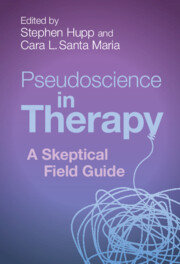Book contents
- Pseudoscience in Therapy
- Other Books
- Pseudoscience in Therapy
- Copyright page
- Dedication
- Contents
- Contributors
- Preface
- Acknowledgments
- 1 Thinking Critically about Therapy
- 2 Depression
- 3 Bipolar Spectrum
- 4 Anxiety
- 5 Obsessions and Compulsions
- 6 Trauma
- 7 Dissociation
- 8 Pain
- 9 Eating Issues
- 10 Insomnia
- 11 Sexual Issues
- 12 Substance Use and Addiction
- 13 Significant Cognitive Decline
- 14 Antisocial Behavior
- 15 Personality
- 16 Psychosis and Schizophrenia
- 17 Autism Spectrum and Intellectual Disability
- 18 Inattention and Hyperactivity
- 19 Tics
- 20 Couples Discord
- Postscript: Scientific Skepticism Resources
- Index
- References
2 - Depression
Published online by Cambridge University Press: 16 March 2023
- Pseudoscience in Therapy
- Other Books
- Pseudoscience in Therapy
- Copyright page
- Dedication
- Contents
- Contributors
- Preface
- Acknowledgments
- 1 Thinking Critically about Therapy
- 2 Depression
- 3 Bipolar Spectrum
- 4 Anxiety
- 5 Obsessions and Compulsions
- 6 Trauma
- 7 Dissociation
- 8 Pain
- 9 Eating Issues
- 10 Insomnia
- 11 Sexual Issues
- 12 Substance Use and Addiction
- 13 Significant Cognitive Decline
- 14 Antisocial Behavior
- 15 Personality
- 16 Psychosis and Schizophrenia
- 17 Autism Spectrum and Intellectual Disability
- 18 Inattention and Hyperactivity
- 19 Tics
- 20 Couples Discord
- Postscript: Scientific Skepticism Resources
- Index
- References
Summary
This chapter describes pseudoscience and questionable ideas related to major depressive disorder and persistent depressive disorder. The chapter opens by discussing controversies such as how to best consider grief as it relates to major depressive disorder. Dubious treatments include dietary supplements, the ketogenic diet, massage therapy, and apispuncture (i.e., the application of bee stings). The chapter closes by reviewing research-supported approaches.
Keywords
- Type
- Chapter
- Information
- Pseudoscience in TherapyA Skeptical Field Guide, pp. 11 - 23Publisher: Cambridge University PressPrint publication year: 2023



